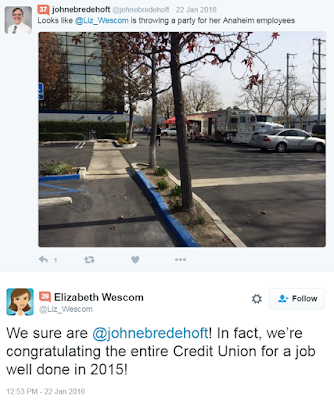Before I launch into the main topic of this post, let me provide you with an update on "The Porch" that I mentioned last November.
The update is that there is no update.
Here's what I said in November about the construction in the public area of my office building:
Now this would be the ideal time to post a picture of The Porch - perhaps a selfie with me, a cup, and the metal shop et al in the background. Except that The Porch is kinda sorta boarded up at the moment....
You see, my company does not own the building, and only leases a portion of the building. The rest of the building is empty, which is perhaps what is motivating the building owner to renovate the lobby area, including The Porch....
There's all sorts of construction now, and my formerly peaceful oasis has all sorts of scaffolding, temporary barriers to keep you from falling off The Porch, and construction workers scurrying around doing important stuff.
I'm not sure how much longer the construction will take, but we'll see what things look like when it's all finished.
Nearly two months later, the construction is still going on, and my formerly peaceful oasis has all sorts of scaffolding, temporary barriers to keep you from falling off The Porch, and...well, you get the idea.
In that same post, I mentioned my friend Liz. Her formal name is Elizabeth, but she lets you call her Liz. That's the name she uses on Twitter and Instagram. Now Liz works right across the road from The Porch, at the Wescom Building in Anaheim.
Actually, she works at the Wescom Building in Pasadena.
Actually, she doesn't work at either place.
Because - and I hope you're sitting down for this - Liz Wescom doesn't exist.
Oh, sure, we chat at times.
But that does not negate the fact that Liz Wescom is a fictional entity, created by Wescom's marketing department, or perhaps by an outside advertising agency. All that I know is that before she was on Twitter and Instagram, she was inside Wescom automated teller machines (see page 5 of PDF).
But Wescom isn't the only entity that creates non-existent spokespeople. As a child, I was scared of Mr. Clean, but was not all that scared of Mr. Whipple. And on a more geopolitical front, the United Nations tried (and failed) to enlist Wonder Woman as a spokesperson.
Let's face it, we like to associate with people, even when dealing with corporations. And if the corporation doesn't have a real live person like Lee Iacocca or Steve Jobs, then the corporation has to use a fake one. In some cases, a real spokesperson eventually becomes a fake one - Colonel Sanders being a notable example.
But do these fake spokespeople work? In some documented instances, they work really well. One example: the American Family Life Assurance Company of Columbus, Georgia had a barrier when getting business, because someone asking for insurance isn't going to necessarily remember "American Family Life Assurance Company." Even the acronym - AFLAC - isn't something that you intuitively remember.
Unless a duck says it.
To solve this problem, they decided to experiment using a duck as a mascot since the brand name sounds like the “quack quack” sound a duck makes. Upon investing in advertising to promote the duck and the business, the result has been phenomenal with name recognition and profits soaring. In fact, name recognition has been at 91% – higher than big insurance companies MetLife or Cigna and in the same ballpark as behemoths McDonald’s and Coca Cola.
Now that recognition helps bring the revenue in to a life insurance company - or to a chicken fast food joint, a toilet paper manufacturer, or a credit union.
The evolution will not be televised - Bryan Adams and AllMusic
-
If you poke around on the Internet, you can find this odd FAQ:
*Why can't I find Bryan Adams on AllMusic? Due to the request of Mr. Adams,
we are no long...
6 years ago

